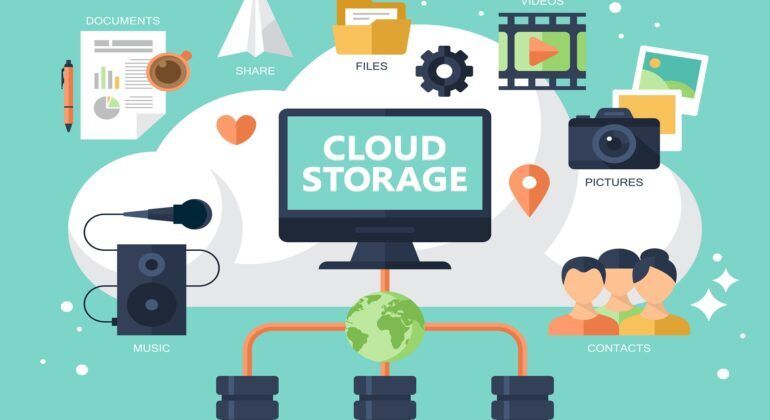7 Key Factors To Determine The Best Cloud Solutions Provider

Today, most businesses are steadily moving to the cloud to reduce expenses, streamline workflows, and eliminate the need for in-house IT hardware and staff.
Besides these advantages, the cloud also facilitates collaboration between geographically separated employees and 24/7 access to information. One of the most significant perks for businesses shifting to the cloud is focusing on their core business functions. In contrast, their cloud solutions provider takes care of all cloud maintenance tasks, such as tackling security, IT concerns, support, and backup.
Among the plenty of cloud solutions providers, picking the most suitable one becomes a challenging task. Hence, it is critical to come up with some methodology to get a sense of direction.
Following are a few key factors in determining the best cloud solutions provider for your business.
1. Cloud Security
Data leaks or any cyberattacks are the biggest concerns when it comes to security. Ensure that the cloud solutions provider you select provides several layers of security to prevent such attacks.
Security measures include anti-virus detection, firewalls, data encryption, routine security audits, and multiple user verification. It has to be upgraded regularly to deal with the malicious attacks that occur all the time.
Ensure that your cloud solution provider offers ISO27001 certified security measures that require regular audits. It is an internationally recognized specification for ISMS(Information Security Management System). Achieving ISO 27001 certification means that they’ve created an ISO 27001 compliant information security management system.
It is essential to ask for the company’s track record on security and preventing data breaches. Ensure to inquire about who would access your cloud and whether they perform employee background checks to deal with possible cybercriminals.
2. Infrastructure Cost Savings
Since cloud migration is costly, potential cost savings should be one of the essential factors to consider while picking a cloud solutions provider.
Measure your infrastructure costs under four subheads such as networking, server, storage, and facilities. The hardware and software costs should include the costs of networking, server, and storage.
Facility costs such as power and cooling get overlooked, but they must be accounted for. Then there are other costs such as database management and other software costs. Find a provider who follows transparent cost management and governance approach.
3. Increased IT Productivity
Improving employee productivity is one of the advantages of cloud solutions. Consider a cloud solution provider that best meets your company’s needs and saves time and resources for your employees. To achieve this:
- Plan and measure all the resources, including time and effort, into server budgeting, purchasing, and managing.
- Keep in mind that several tasks can be automated with the cloud, including installation, upgrading, and removing software, which means that your IT team no longer has to deal with these issues or even hardware failure or repair.
- Note that your cloud solution provider will only provide security of the cloud when it comes to security.
4. Reliability & Performance
There are several ways you can use to gauge the reliability of a cloud solutions provider.
Check the solution provider’s performance against their SLAs for the last 6-12 months. A few solution providers publish this information, but most of them will provide it if asked.
Don’t expect perfection when it comes to downtime. It is inevitable, and every cloud solutions provider will encounter it at some point. It’s how they deal with that downtime that’s important. Check whether the monitoring and reporting tools provided are sufficient and integrated into your overall management and reporting systems.
Choose a provider that has established, documented, and proven processes for managing planned and unplanned downtime. The solution provider should have all the processes documenting how they plan to communicate with customers during times of disruption, including timeliness, prioritization, and severity level assessment of issues.
5. Flexibility And Agility
In a fast-paced business condition, only companies that are flexible and agile will survive. Hence, it is necessary to choose a service provider who offers all benefits of agility.
Following are a few business agility metrics:
- Time to set up new environments such as storage, networking, and computing.
- The number of new apps and functions launched every year.
- Time to market these new applications and adapt to new functions.
- Access to new cutting-edge capabilities.
- Response time to the complaints or defects in products and services.
An organization must be more agile and respond quickly to change. Choose a cloud solutions provider that offers innovative capabilities.
6. Client Support
It would be best if you choose a provider with an adequate support system. You should have 24×7 access to customer support without limitation and even on holidays. Some vendors provide support for free, while others charge different amounts. Client support is indispensable, especially if you are putting essential business services on the cloud. Therefore, check this out and the average time for response and resolution before purchasing the service.
7. Disaster recovery
Check the solution provider’s disaster recovery provisions, processes, and ability to support your data preservation expectations, such as recovery time objectives. It should include the urgency of data, data sources, scheduling, restore, backup, and integrity checks.
Roles and responsibilities, escalation processes, and proof burden must be documented in the service agreement. It is essential, as your team may be responsible for implementing some of these processes in many cases.
Consider purchasing additional risk insurance if the costs associated with recovery are not covered by the provider’s umbrella terms and conditions.
In Conclusion
Shifting to the cloud has numerous benefits. For one, you are relieved of investing in hardware and maintenance expenses, and your IT team can focus on essential business support.
Include both hard and soft factors in your evaluation of cloud solutions providers. Look into their case studies and testimonials to recognize and validate the certifications and standards they adhere to and what their customers say about them.
Following the disruptions caused by the Covid-19 pandemic, businesses are transitioning to the cloud for better adaptability, security, and resilience. The speed at which companies are adapting to the cloud has improved drastically due to the ongoing pandemic.
Disclaimer: The information on this website and blog is for general informational purposes only and is not professional advice. We make no guarantees of accuracy or completeness. We disclaim all liability for errors, omissions, or reliance on this content. Always consult a qualified professional for specific guidance.






